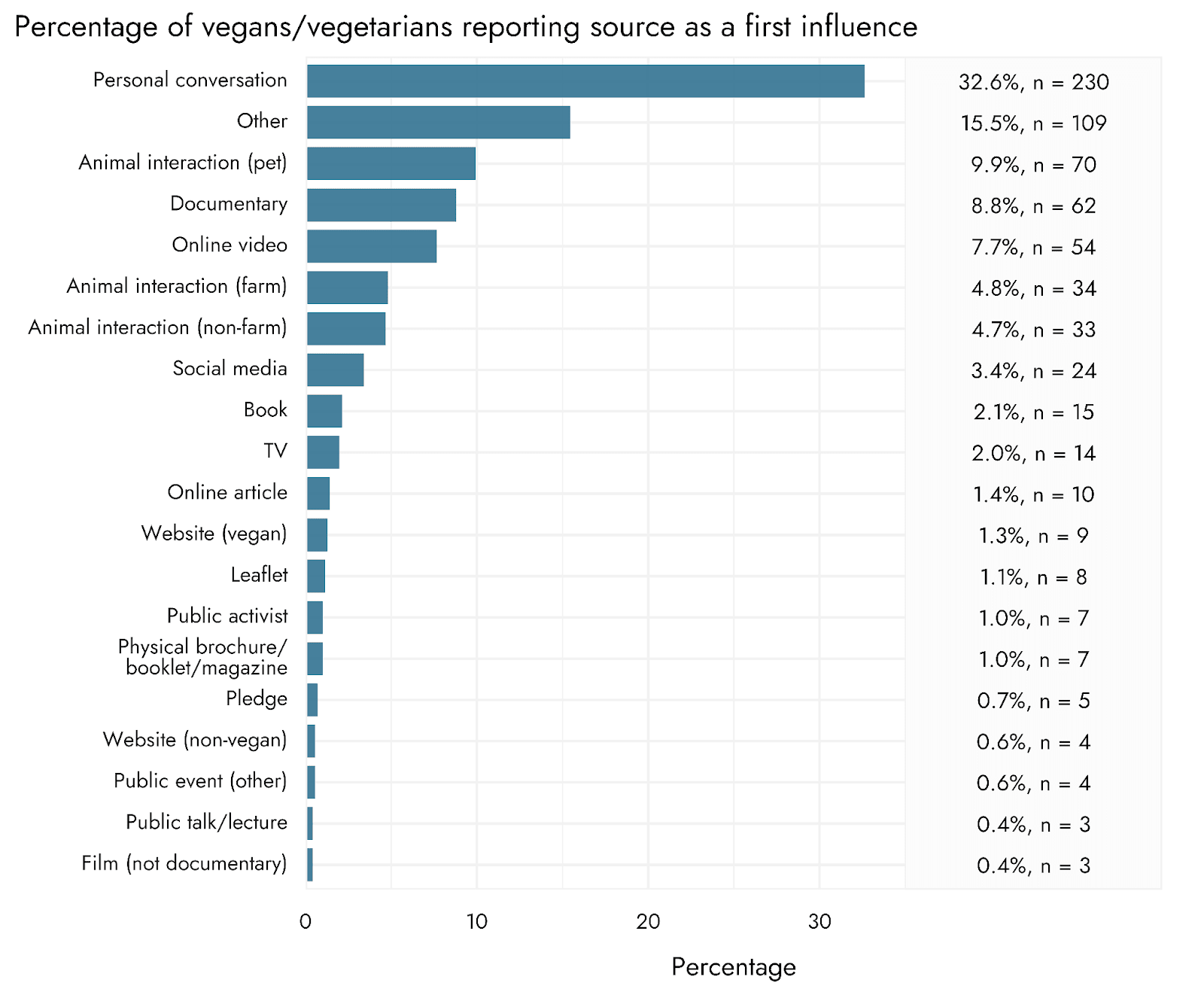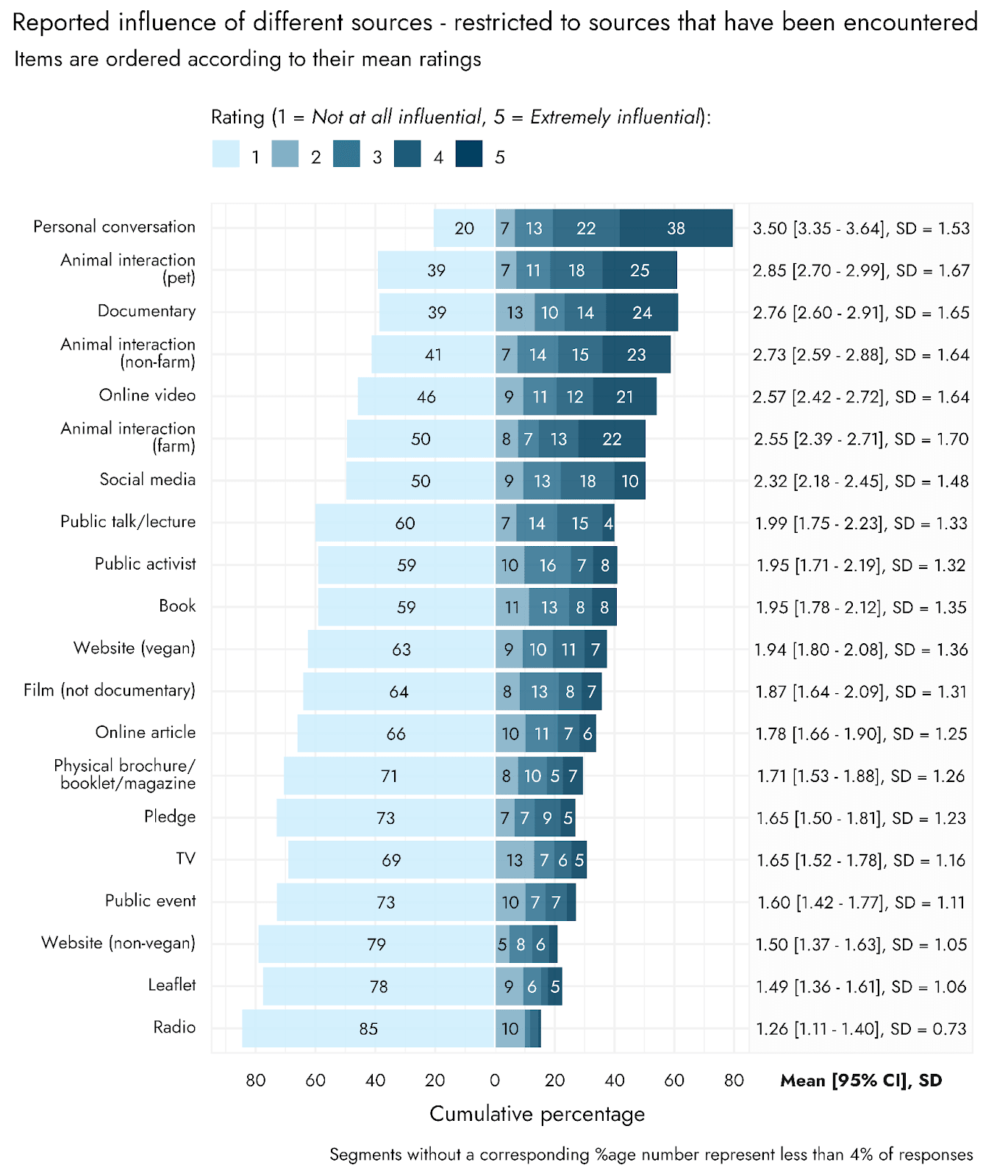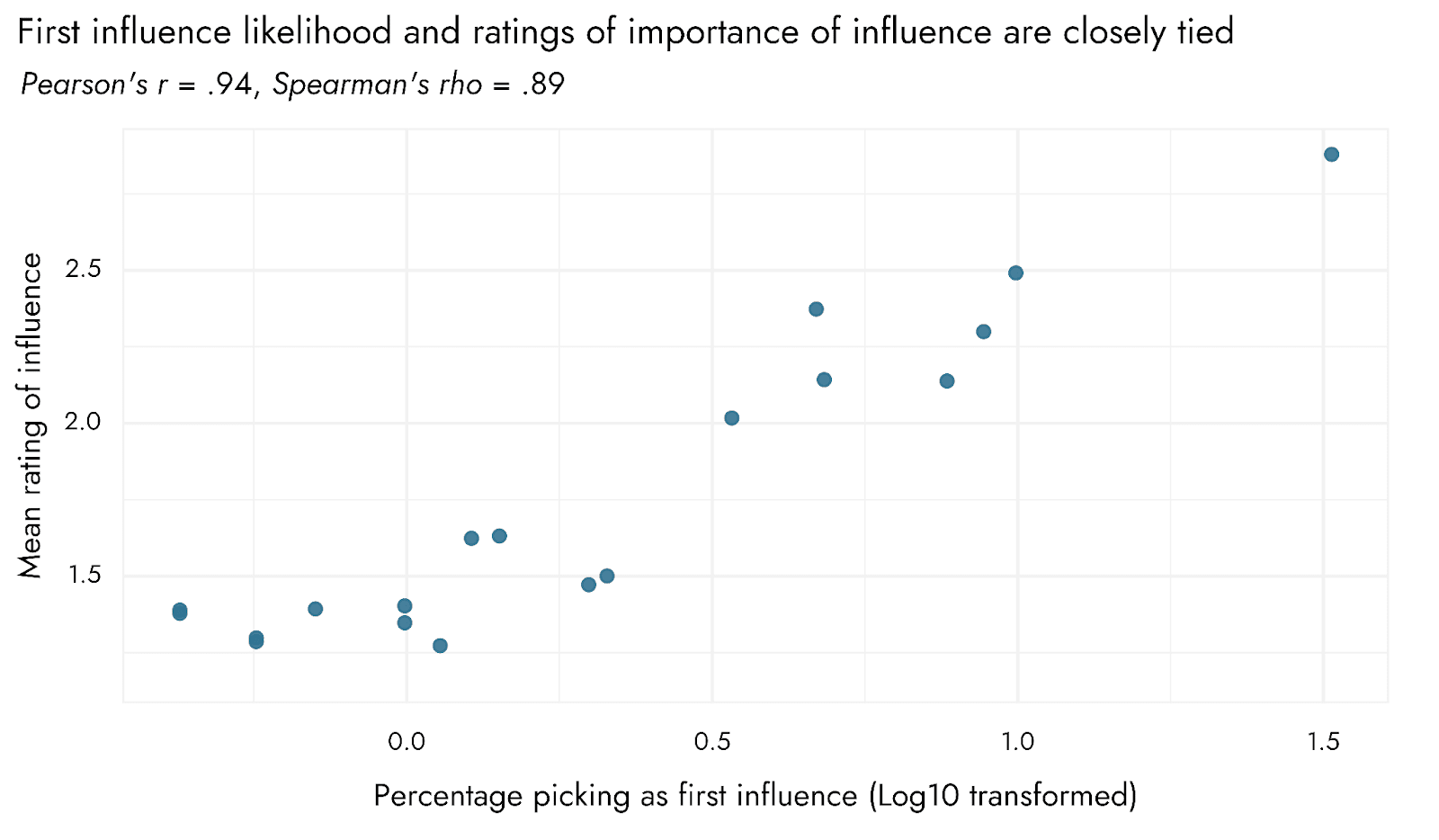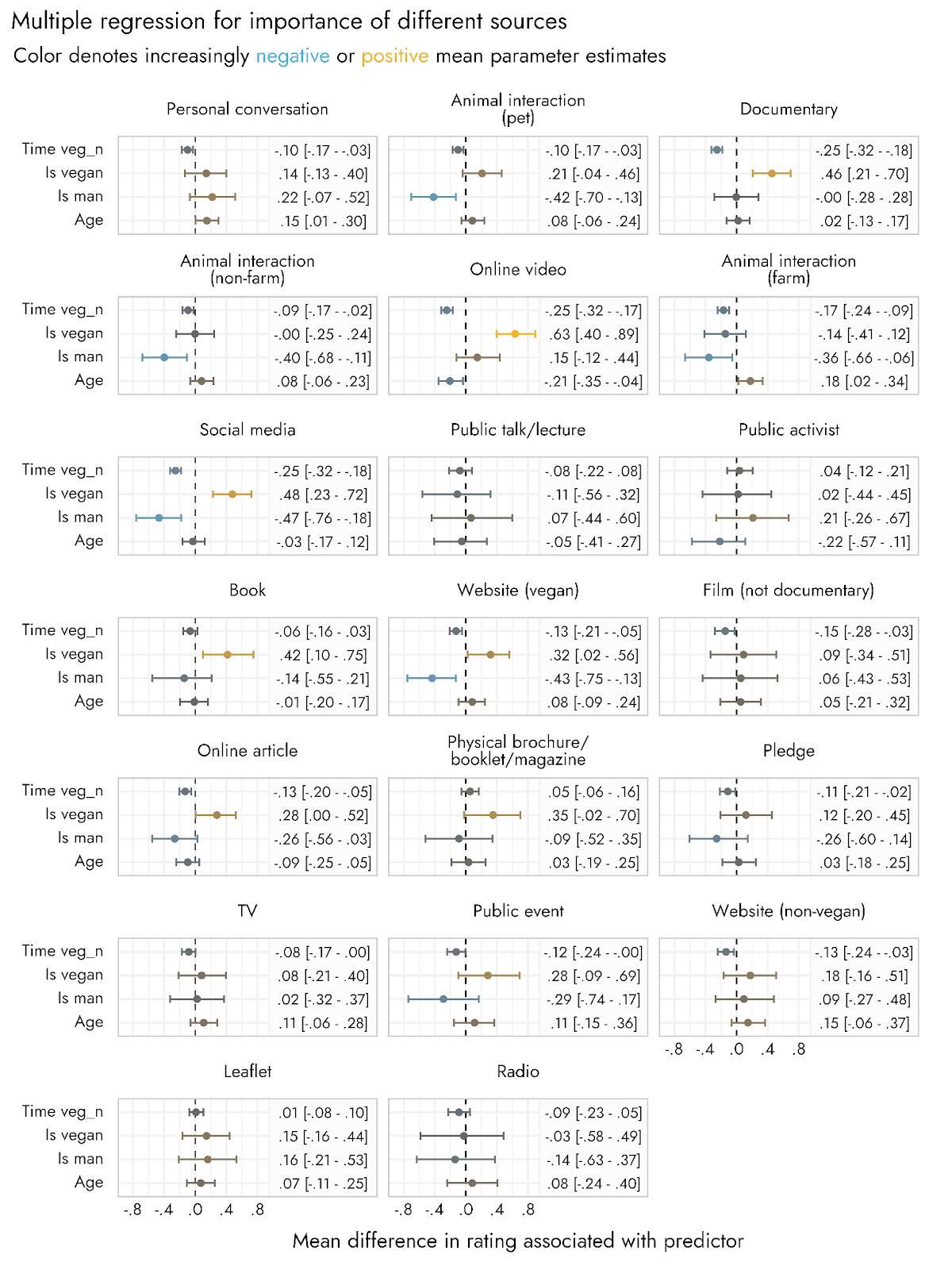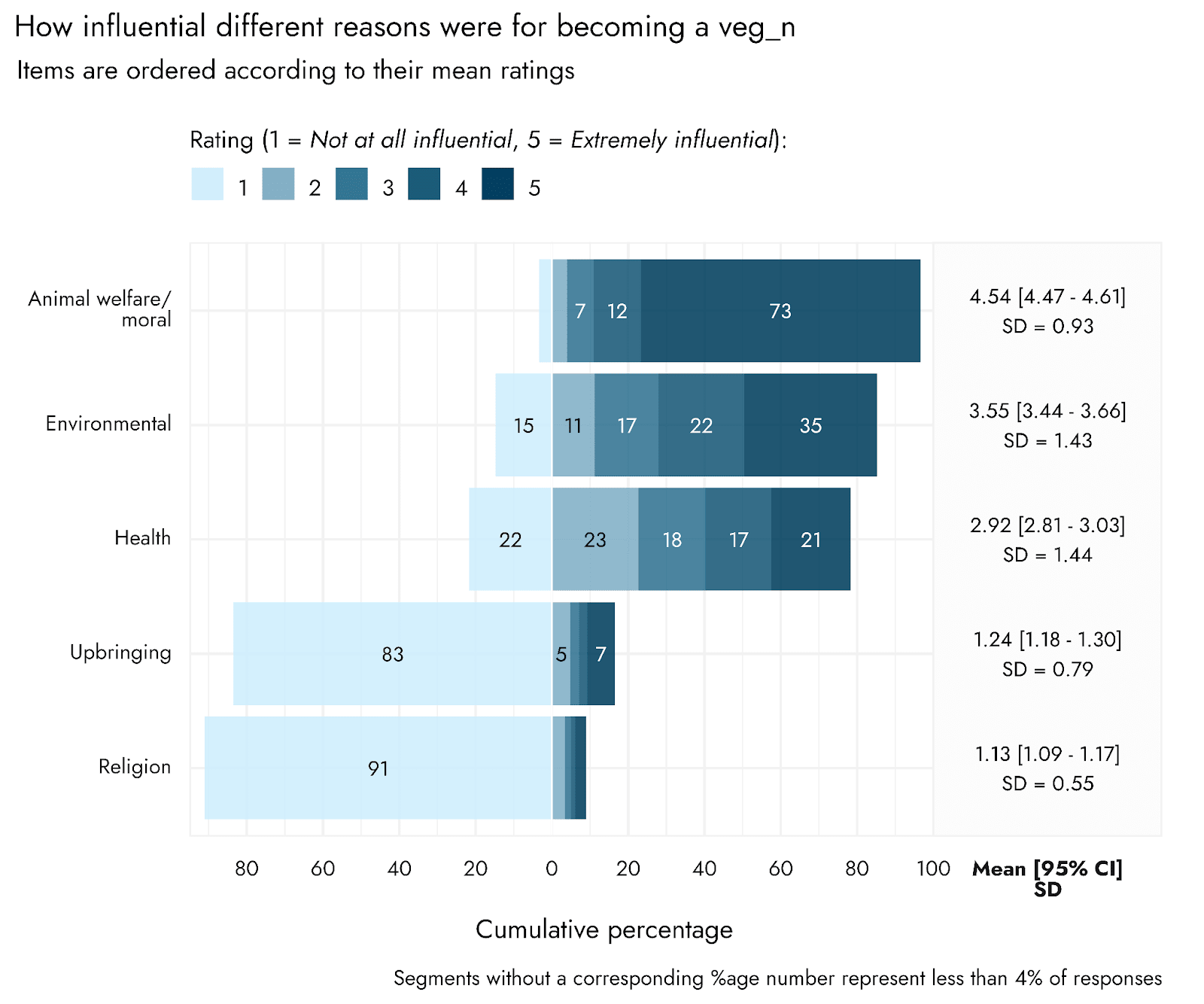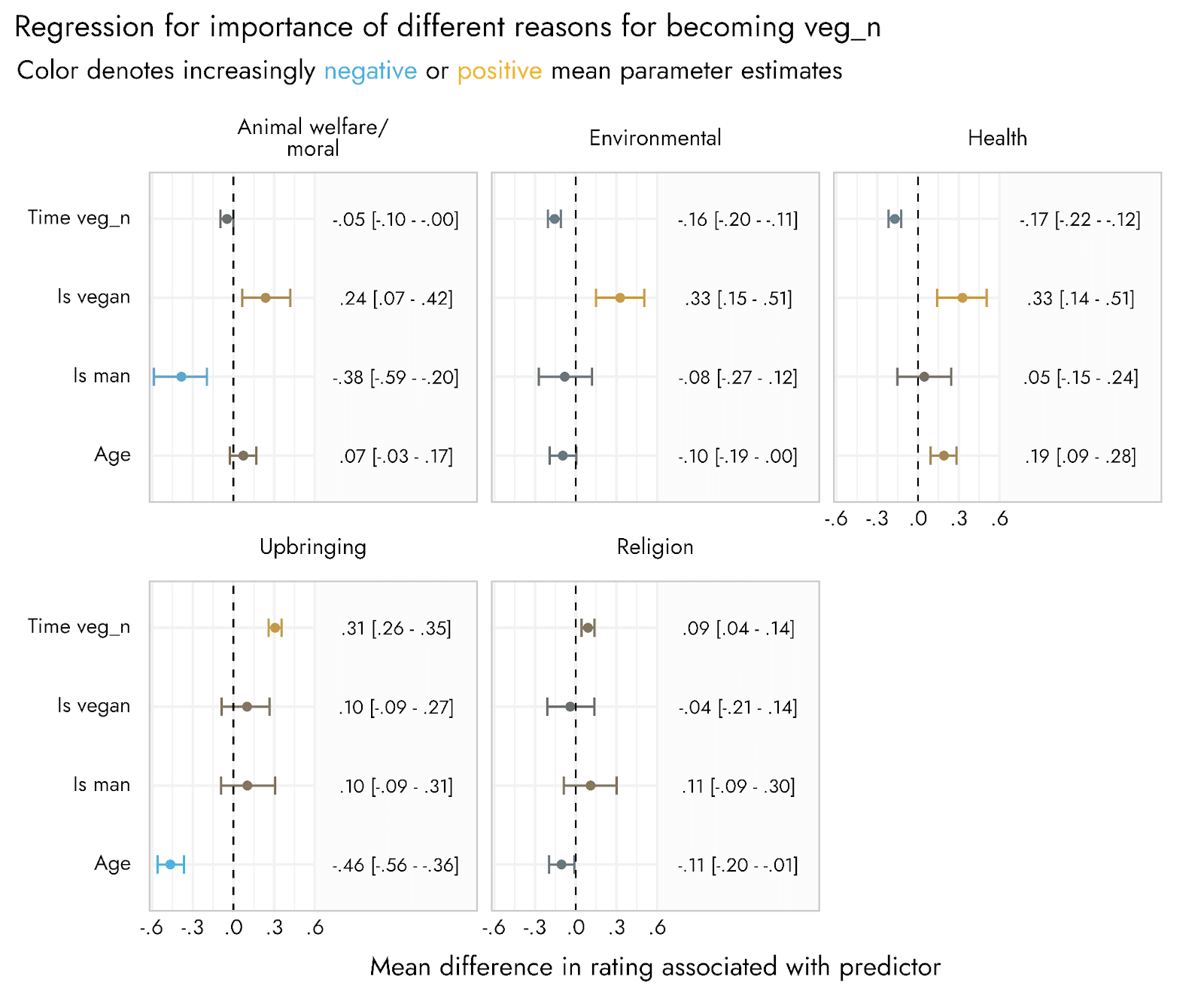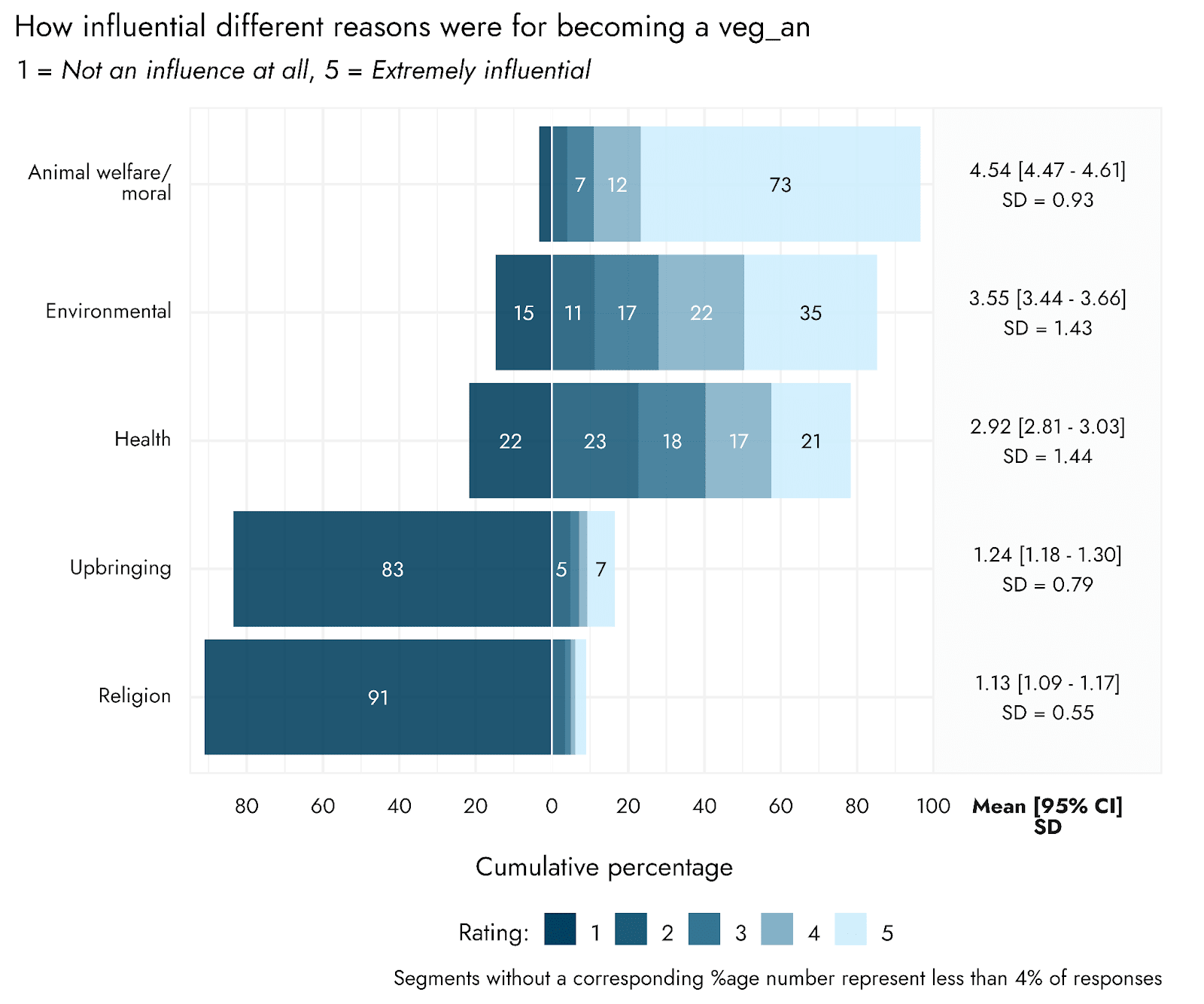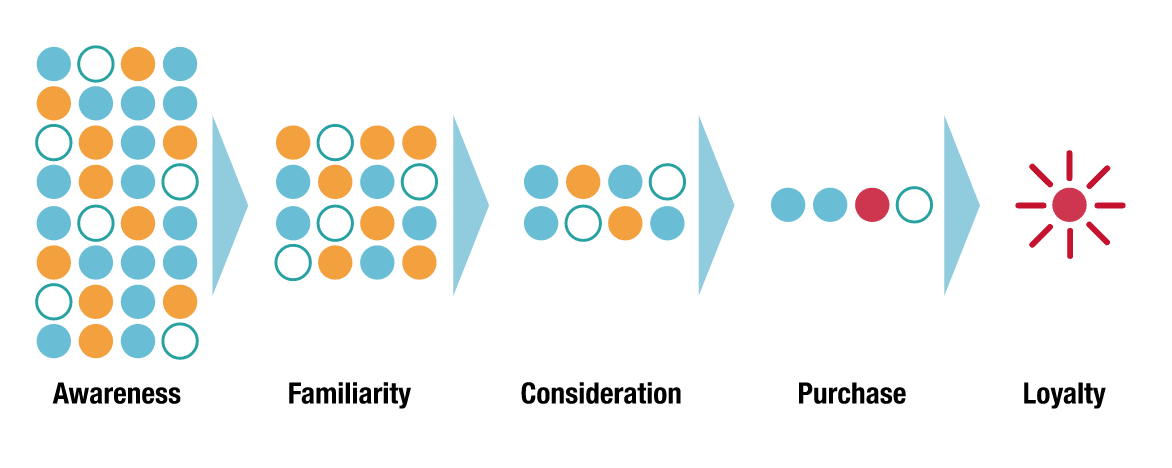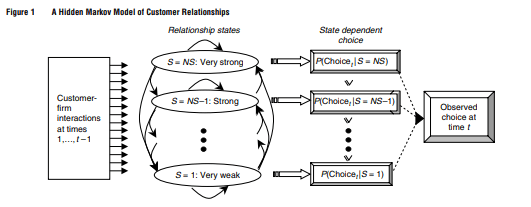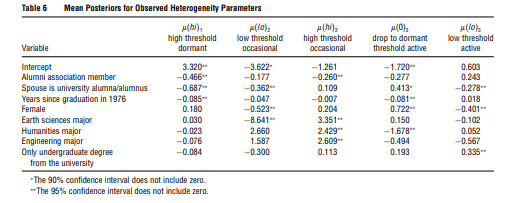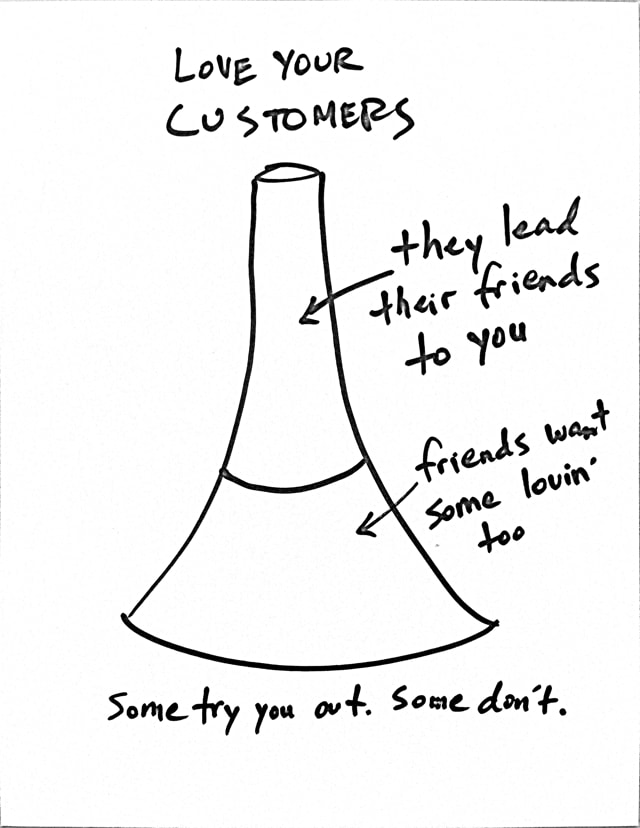Influences on individuals adopting vegetarian and vegan diets
By Jamie E, David_Moss @ 2023-08-25T09:38 (+74)
Topline summary points:
- Personal conversations/interactions are reported to be the most important influences in adopting a vegan or vegetarian diet, and most frequently also the first influence in getting someone interested in dietary change
- Interactions with animals also remain a strong source of influence
- Exposure to documentaries, social media, and online videos are also attributed considerable importance, particularly among more recent adopters, and those whose diet was vegan (rather than vegetarian)
- Concerns over animal welfare are rated as the most important reasons for adopting a vegetarian or vegan diet, though environmental and health concerns are also rated relatively highly - again especially among more recent adopters
Publication note
This post is based on data obtained in December 2019, and was produced by request on a short timeframe. As such, this is a ‘blog post’, not a substantive research report.
Background
Decreasing animal-product consumption can have numerous benefits, from increasing the sustainability of the food system (Clark & Tilman, 2017) to reducing animal suffering (Broom, 2007; Bryant, 2019; Park & Singer, 2012). Yet, dietary change can be challenging. Factors such as habit, familiarity, taste preferences, food availability, cooking skills, social context, and cultural traditions can all pull against the adoption of a new diet (Peacock, 2023; Graça et al., 2019; Valli et al., 2019). Determining what methods are most effective for encouraging more plant-based diets may help guide advocates and change minds, ultimately reducing animal suffering and increasing food system sustainability.
A growing body of literature is examining the question of what works to reduce animal-product consumption. Several systematic reviews (e.g., Bianchi et al., 2018a; Bianchi et al., 2018b; Graça et al., 2019) have collated experimental evidence for dietary change interventions. In experimental studies, the experimenters administer an intervention (e.g., education about environmental consequences of meat consumption), and evaluate how this affects a particular outcome (e.g., self-reported meat consumption). Despite generally having high internal validity, these study designs often have limited external validity because they test efficacy under ideal circumstances that are unlikely to be present in real-world situations. Furthermore, such studies often test different interventions in isolation and in different contexts, posing difficulties for the comparison of effects across interventions.
An alternative approach is to examine what works retrospectively. That is, to ask: why did current vegetarians and vegans make that dietary change? Although previous work has examined this topic, most of it has been through informal surveys hosted on blogs (e.g., The Two Vegans, 2016; The Vegan Truth, 2013; VOMAD, 2018). This recruitment method can lead to biased samples (e.g., toward individuals who are particularly engaged in veganism and willing to answer questions about it without reimbursement). Other limitations of the prior surveys include having incomplete response options (e.g., assessing animal welfare motivations for going vegan but not health or environmental reasons: The Vegan Truth, 2013), assessing first but not main influences on dietary change, and not asking about the relative importance of different influences. Despite these limitations, this initial research suggests that personal connections and educational films or documentaries are some of the more important influences (VOMAD,2018; The Vegan Truth, 2013).
The aim of this project was to provide a more comprehensive, systematic survey of what influences people to adopt vegan or vegetarian diets. We will consider both motivating reasons (e.g., health, environmental, animal welfare) and methods/media (e.g., books, documentaries, social media, leafleting).
Method
Participants and Procedure
We sampled 1028 US respondents from Prolific.co, an online platform where people are recruited and paid to complete surveys. Survey recruitment was limited to those who had selected “Vegetarian Diet (you refrain from the consumption of meat (red meat, poultry, seafood, insects and the flesh of any other animal)” or “Vegan Diet (you refrain from eating any animal products)”, or selected “Vegetarian” or “Vegan” on previous Prolific screeners, though respondents would not be aware of these recruitment criteria when entering the survey. Respondents were paid £1.56 for a median hourly rate of £10.80. Our survey was advertised to participants on the platform as “A survey about behaviour and attitudes”, with additional descriptive information: “In this study you will be asked about which foods you eat, what influences your decisions and demographic information. The average time taken to complete this survey when previously run was approximately 10-12 minutes”. The survey was live on 16/12/2019 between 14:44 PM and 22:48 PM.
Respondents were excluded if they did not currently follow a vegetarian or vegan diet (n = 178). They were also excluded if they reported being vegetarian or vegan for over a year, but ate meat in the past three months (an additional n = 108). Participants indicating that their sex was other or missing were excluded (an additional n = 25), as analyses involving sex could not provide meaningful parameter estimates for such a small cluster of participants.[1] Participants were also excluded for implausible years of adoption or uninterpretable responses on this question (a final further n = 12), leaving an N of 705.
Survey items
Survey items were developed to understand what methods influenced participants to go vegetarian or vegan (including the first influence, main influence, and importance of influences), reasons participants went vegetarian or vegan (e.g., health, environmental, animal welfare), and relevant demographics. The full list of survey items can be downloaded here. Key questions for the present analyses were: Reported source that first got respondent interested in a vegetarian or vegan diet, Ratings of the importance of different sources, Reported exposure to different sources, Ratings of importance of reasons for becoming vegetarian or vegan, as well as covariates: Age, Time on diet, Gender, and Type of diet.
Results
First influences on becoming vegetarian or vegan
Raw outcomes
Personal connections/conversations were overwhelmingly endorsed as a first influence on becoming vegan or vegetarian. Collectively, interactions with animals (whether companion animals, farm animals, or other animal experiences) were also frequently endorsed, summing to approximately 20% of respondents. Documentaries and online videos were the next most frequently noted sources. The respondent-defined ‘other’ category was also highly rated (numerous respondents noted, for example, simply not liking the taste or texture of meat).
Regression model
To understand what factors might relate to selecting a source as a first influence, we analyzed respondents’ reports of first influences using multinomial regression, with outcomes predicted by Age, Duration of Diet, Type of Diet (Vegetarian vs. Vegan), and Gender (Women vs. Men). For these analyses, we collapsed the three separate animal interaction categories (‘interaction with [companion/farm/non-farm] animals’) into a single animal interaction category, as participants’ descriptions of what they meant by these different categories suggested that they did not entirely differentiate them (e.g., many people noted experiences with both farmed and companion animals when referring to the final ‘non-farm’ animal category). In addition, to prevent issues with estimating probabilities for very low likelihood sources, we generated an overarching ‘other’ category to encompass influences that were were reported by less than 2.5% of the respondents overall, yielding a total of six sources of influence: Personal conversation, Animal interaction, Documentary, Online video, Social media, and Other.
In multinomial regression, direct parameter estimates from the model are not readily interpretable, as they always refer to some outcome or predictor relative to a reference category (e.g., everything relative to the likelihood of ‘Documentary’ being selected) - which in this case would be arbitrary. Hence, to convey the results of the regression we present expected proportions of people picking each outcome, while varying the predictor of interest. In the plots below, the estimates are generated with one predictor varying, and then the other predictors held at a constant: so, unless explicitly varied, gender would be the average of men and women, diet would be the average of vegetarians and vegans, age would be 30 (approximately the sample median), and years on diet would be 10 years (also approximately the median in the sample).
Based on the regression analysis, there appear to be several differences in the likelihood of selecting different influences as a function of diet and time on the diet, and some probable associations with gender, relatively little association with age.
Comparing Vegetarian with Vegan respondents, Vegans were approximately 2.9 times more likely to note social media as a first influence, 2.7 times more likely to note Online videos as a first influence, and 1.6 times more likely to pick Documentary. Vegetarian respondents tended to be more likely to select Animal interactions and Other sources of influence.
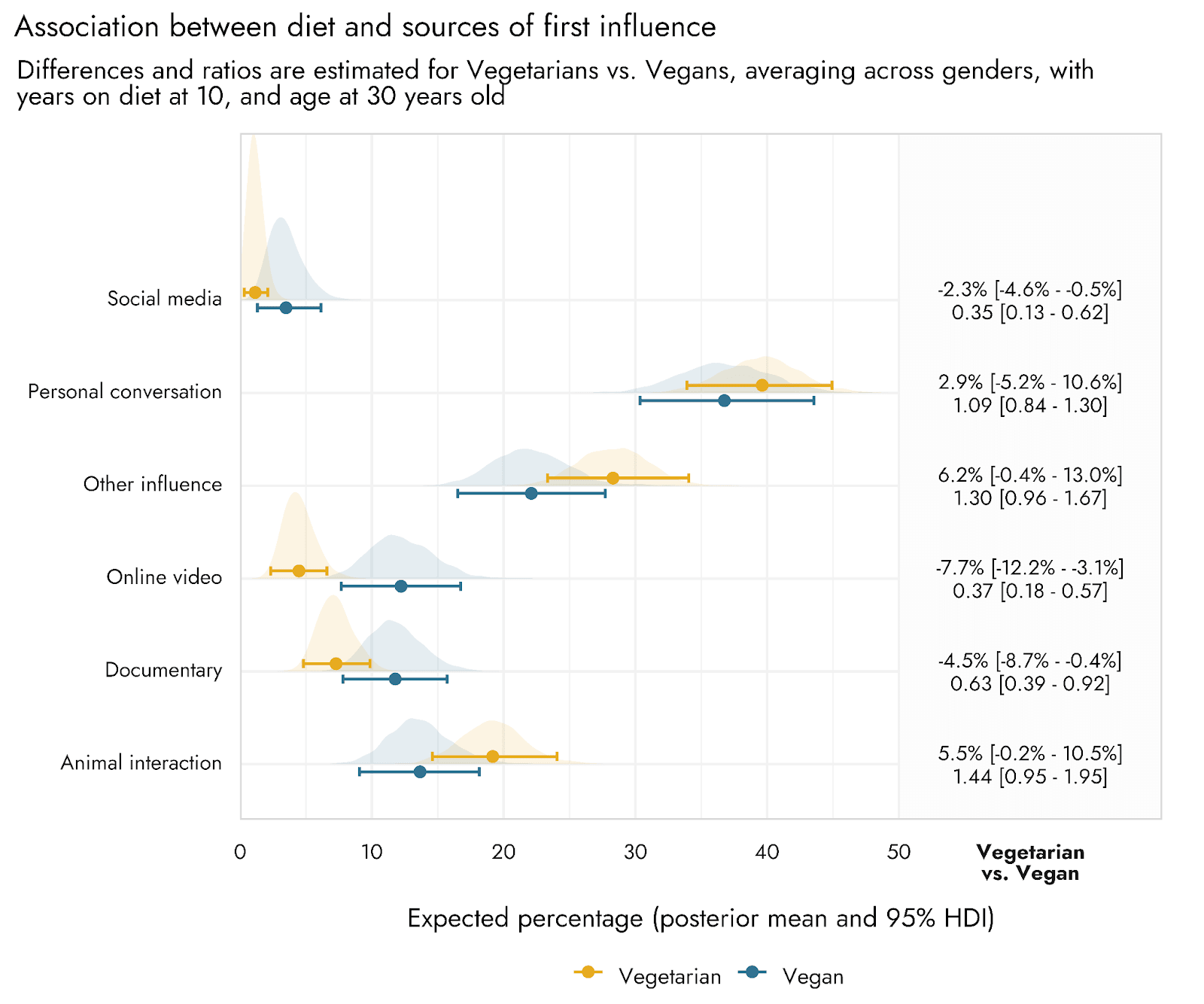
Comparing across genders, men were 1.5 times more likely to report Personal conversation as a first influence than women. In contrast, women tended to report Animal interactions and Documentaries as more likely sources of influence.
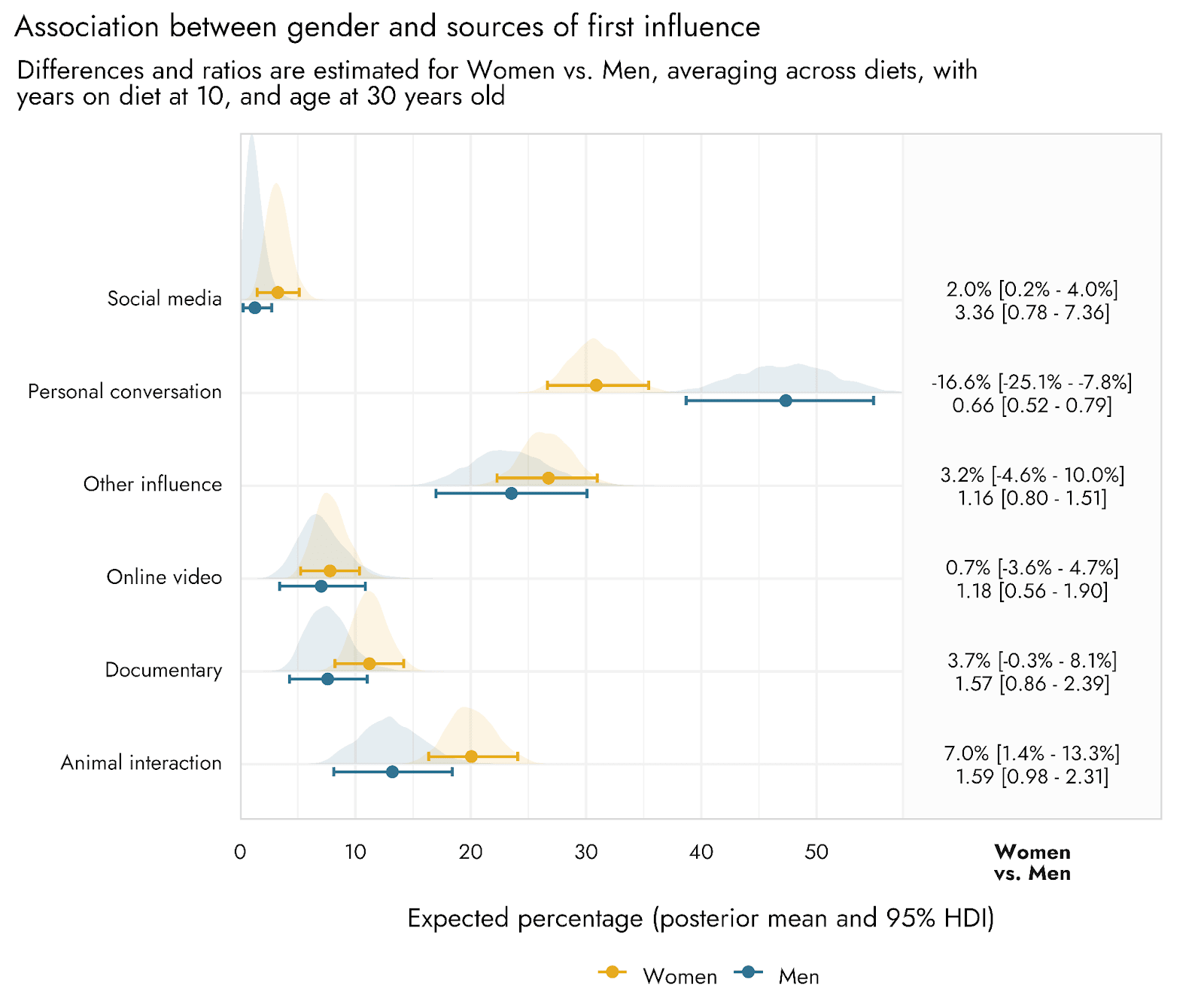
Time on a vegan/vegetarian diet was associated with the likelihood of selecting every separate outcome. Comparing the estimates of those on their diet for 5 vs. 15 years, more recent adopters were 3.5 times more likely to select Social media, 2.5 times more likely to select Online videos, and 1.9 times more likely to select Documentary. Conversely, those adopting their diet 15 years ago were 1.2 times more likely to select Animal interaction, 1.1 times more likely to select Personal conversation, and 1.3 times more likely to select Other. Hence, it would appear that with increasingly recent adoption of vegetarian or vegan diets, different sources of influence are rising to prominence: Documentaries and a range of online sources such as videos and social media are taking up an increasing share of ‘first influence’ space in more recent years.
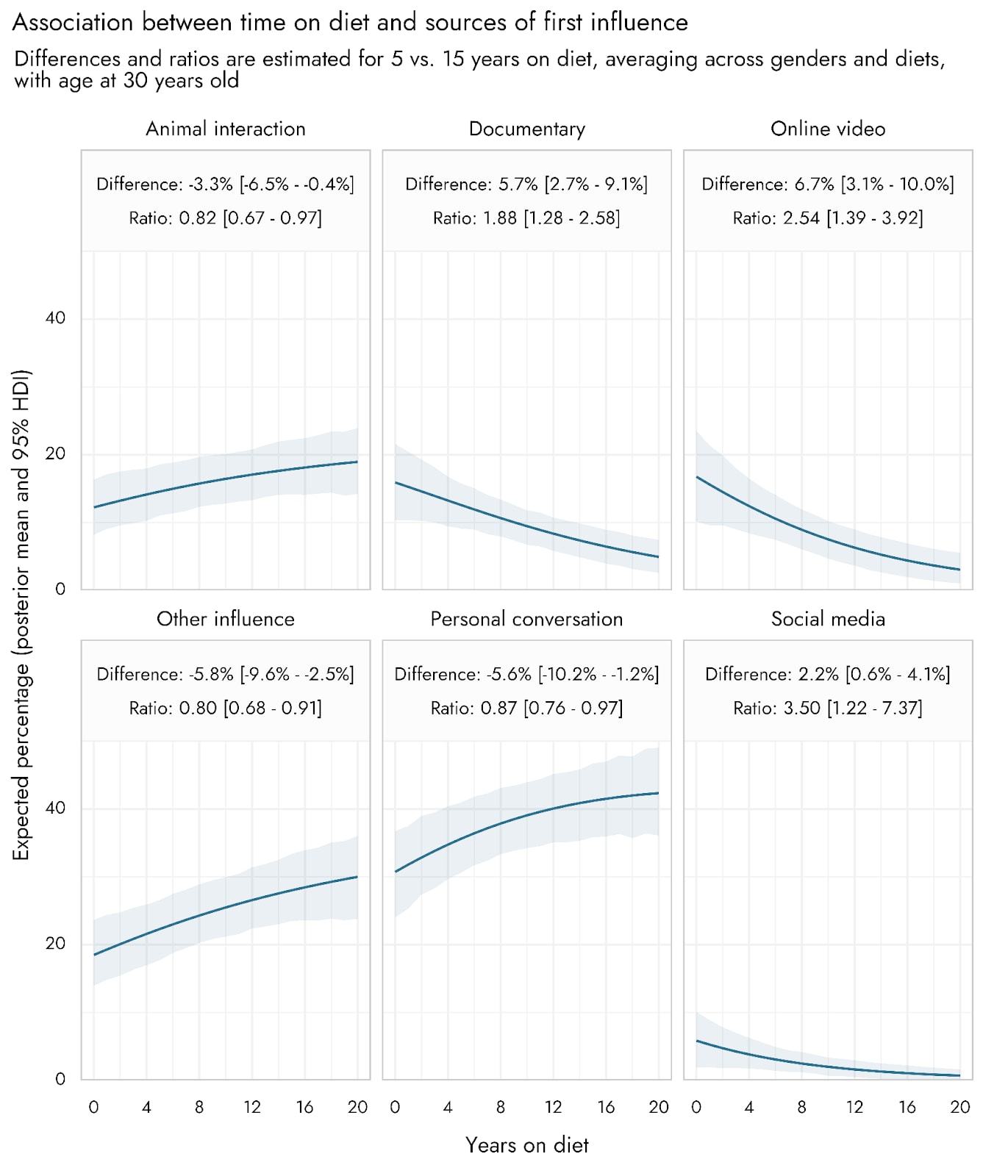
For age, estimates for differences tended to be small or did not reliably tend in one direction or another. However, there was a tendency for Social media to be selected less frequently by those of higher ages.
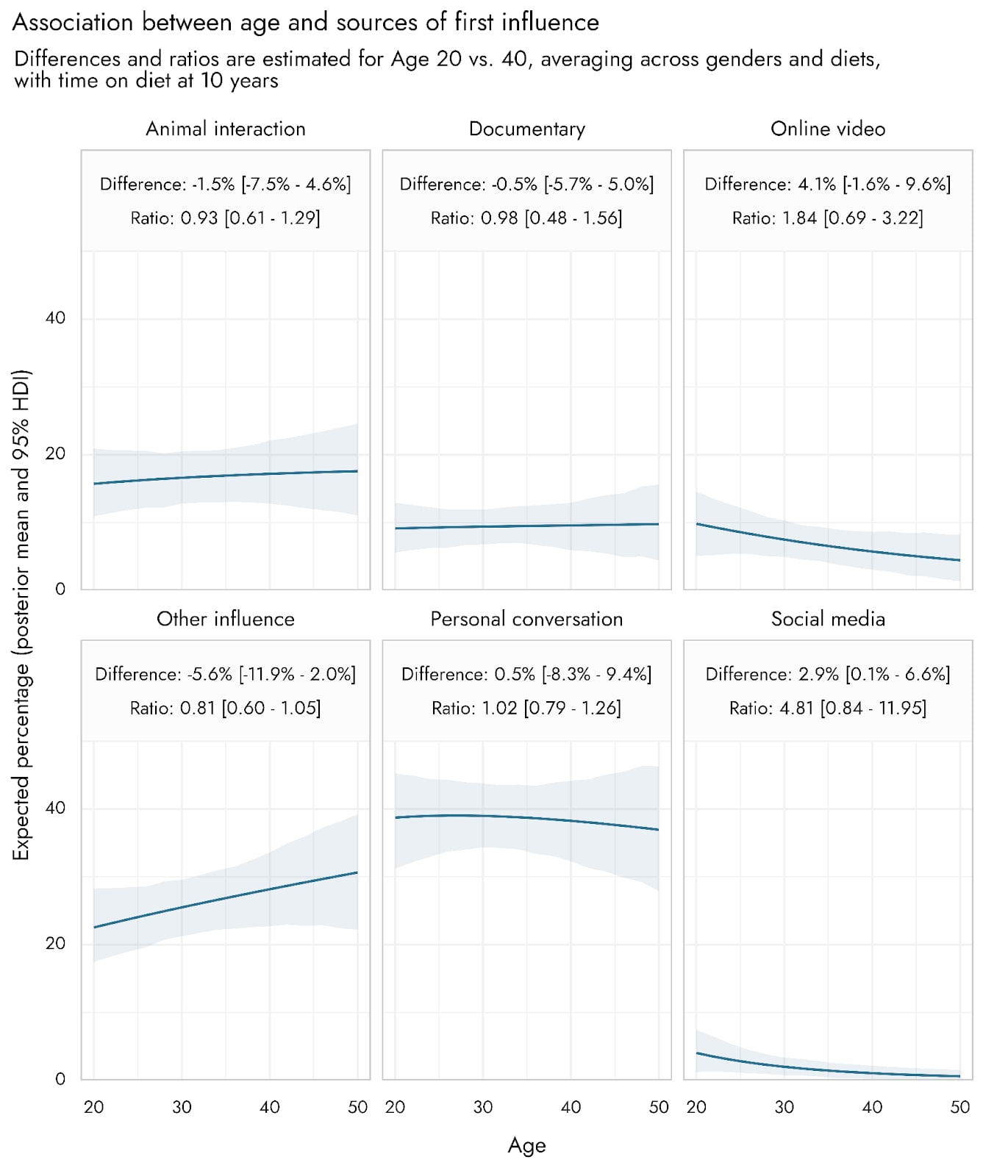
Importance of different sources on becoming vegan or vegetarian
Raw ratings
Respondents were also asked to rate how important they thought each influence was on their decision to become vegetarian or vegan, from 1 (not an influence at all) to 5 (extremely important influence). The data presented in this section focuses only on those participants who reported having encountered the respective source.
It can be seen that there was substantial variation in the importance attributed to different sources (pairwise comparisons among sources are presented in Appendix section A). Moreover, for three quarters of the different sources, at least half the respondents reported them not being an influence at all. Personal conversation was not only the most likely to be selected as a first influence, but also received the highest average rating of importance if it was encountered. Interactions with animals were also given relatively high ratings, as were documentaries and online videos. The trend of ratings of the most influential sources largely mirrors the chances of items being picked as a first influence, with the correlation between mean rating across the sample and the log10 transformed percentage of respondents picking the item as a first influence at .94.
Regression model
To understand what factors might relate to ratings of importance, we analyzed importance ratings using a multiple regression model, again including gender, diet, age, and time on diet as predictors. The figure below presents parameter estimates for each predictor variable (the Time veg_n[2] parameter estimate represents a change in duration of 5 years, and the Age parameter represents a change in age of 10 years). Some notable trends stand out: men tended to rate several sources as less influential than did women, including all Animal interaction items, Social media, and vegan websites. There weren’t any sources that men reliably rated as more influential than women (for which the 95% HDI for the item excluded no effect), although men did tend to rate Personal conversations as more influential. Vegans rated Documentaries, Online videos, Social media, and Books are more influential than did Vegetarians. Similarly to trends in the likelihood of reporting them as first influences, those with more time on a vegetarian/vegan diet rated Online videos, Social media, and Documentaries as less influential. Having more time on a vegetarian/vegan diet was also associated with providing higher ratings for the influence of each of the Animal interaction items.
Overarching motivations for becoming vegan or vegetarian
Raw ratings
Only a minority of respondents indicated that either their upbringing or religious beliefs were at all influential for them in taking up a vegetarian or vegan diet, although 7% still indicated that their upbringing was an extremely strong influence. Still, by far the most endorsed reasons were animal welfare concerns, which 73% indicated were extremely important for them. Though not as highly endorsed as animal welfare reasons, both environmental and health reasons were much more endorsed that upbringing or religious beliefs, which had at least some influence for most respondents.
Regression model
As with previous analysis, we conducted a multiple regression, with gender, diet, age, and time on diet as predictors. Parameter estimates for each predictor variable are shown below (the Time veg_n parameter estimate represents a change in duration of 5 years, and the Age parameter represents a change in age of 10 years).
Upbringing and religion were reported as being more influential among those who had taken up their diet longer ago - understandable given the typically early influence of religious beliefs, and age requirements for the survey meaning that these respondents would have likely been on their diet for a relatively long time.
Perhaps of greater interest, we observed that adopting a vegan/vegetarian diet more recently was associated with higher endorsement of environmental and health concerns. Furthermore, relative to vegetarians, vegans reported greater endorsement of animal welfare/moral concerns, environmental, and health concerns. Older respondents also reported higher levels of endorsement of health-related reasons, perhaps reflecting increasing concern over one’s health with age, which can produce lifestyle changes. Finally, relative to women, men reported substantially less agreement with animal welfare related concerns as being a reason for them.
Discussion
By focusing on a less highly selected population of respondents than has been used in much previous research - those on a recruitment platform who merely happen to be vegetarian or vegan, rather than those affiliated with specific vegan websites/groups - this research aimed to advance our understanding of sources of influence and reasons for adopting vegetarian and vegan diets.
Similarly to previous research, we found that personal conversations/connections were a particularly important source of influence in adopting vegan or vegetarian diets, as were documentaries, being both the most cited first influence and the most highly rated influence in terms of importance. We also found that documentaries and interactions with animals rank highly among sources. Some sources of influence that have only become possible or prominent over the last decade - such as online videos and social media - were also noted as important sources. Having adopted a vegan/vegetarian diet more recently was associated with greater importance attributed to documentaries, online videos, and social media, as well as a greater likelihood of these being a first influence, indicating the increasing importance of these sources in the contemporary media ecosystem. While this observation may seem obvious, in that people who took up their diet before the prominence of social media and online video sharing simply could not have been influenced by them, the mere existence of these sources of influence does not necessitate that people attribute importance to them. We specifically found that people do ascribe considerable importance to these sources, and to a higher degree than they do to many more traditional sources such as books, TV, and activists.
Of further interest, we found that there were differences among sources of influence depending on the diet that respondents followed. Vegan respondents reported more importance to these same contemporary sources: social media, online videos, and documentaries than did vegetarians. One possibility is that advocacy via these channels might take on a more all-or-nothing stance with respect to diet than would be possible for a vegetarian advocate, so as to be more engaging and provocative, or simply that those advocates which have such stances are more engaging and generate more virulent content, such that those influenced by these sources tend towards adopting veganism.
Among reasons for adopting a vegetarian or vegan diet, concerns over animal welfare were the most highly rated in terms of importance, although environmental and personal health concerns were also received quite high ratings of importance. Environmental and health concerns were found to be of increasing importance among those adopting their diet more recently, which may reflect increasing awareness of and advocacy regarding possible health benefits of plant-based diets, as well as increasing concerns over anthropogenic climate change. While concerns over animal welfare should not be ignored and remained first and foremost among respondents’ reasons, the findings highlight that there may be multiple points of leverage in advocating for the adoption of a vegetarian or vegan diet other than direct concern for animals, and it is likely that different arguments will appeal more or less to different audiences. As just two examples, we found that older age was associated with increasing importance being attributed to health-related concerns, whereas being a man was associated with giving lower ratings to the importance of animal welfare concerns.
Limitations
Although we believe our sample is likely to be less skewed than in research that has specifically recruited via blogs or through advocacy groups, we remain unsure as to the representativeness of the sample with respect to the total population of vegetarians and vegans. The sample was also restricted to US respondents, and so even if representative of vegetarians and vegans in the US, the findings may not generalize to other areas of the world.
Our conclusions are also limited by the self-report nature of all the outcome variables, which may be susceptible not only to misrepresentation or social desirability effects, but also to lapses of memory and errors of attribution. For example, people may misremember their first influence if the first influence did not stand out as important in their minds, and they may also fail to remember having been exposed to influences that were not important to them. Social psychological research also suggests that people may engage in post-hoc rationalization of their reasons for taking particular ethical stances and are not always aware of the drivers of their behavior (Haidt, 2001). Hence, it is possible that a host of reasons and influences besides those we asked about, or which were endorsed, may also play roles in the adoption of vegan and vegetarian diets.
Conclusion
Although there are many barriers to dietary change, people can and do make shifts to adopt vegan and vegetarian diets. Our findings suggest that ethical reasons - mostly animal welfare and secondarily environmental concerns - and health related concerns are prominent reasons that people do so. The greatest sources of influence tend to be personal interactions, as well as interactions with animals, and the importance attributed to social media, online videos, and documentaries is also high, particularly among more recent adopters of vegetarian and vegan diets.
Drawing insights from empirical research can help generate insights into effective approaches to animal advocacy, and multiple avenues for future research in this domain remain. Surveying a representative sample of the general population regarding their exposure to different sources and its association with dietary choices may help further elucidate the relative reach and influence of different sources. Conceptually replicating and extending the present research with a more recent sample, and possibly focusing more selectively on more recent adopters of vegan and vegetarian diets, may also provide more actionable insights for advocates deciding upon optimal approaches to break through in the contemporary media landscape.
Appendix
A. Probability of Superiority - Pairwise comparisons among influence of items
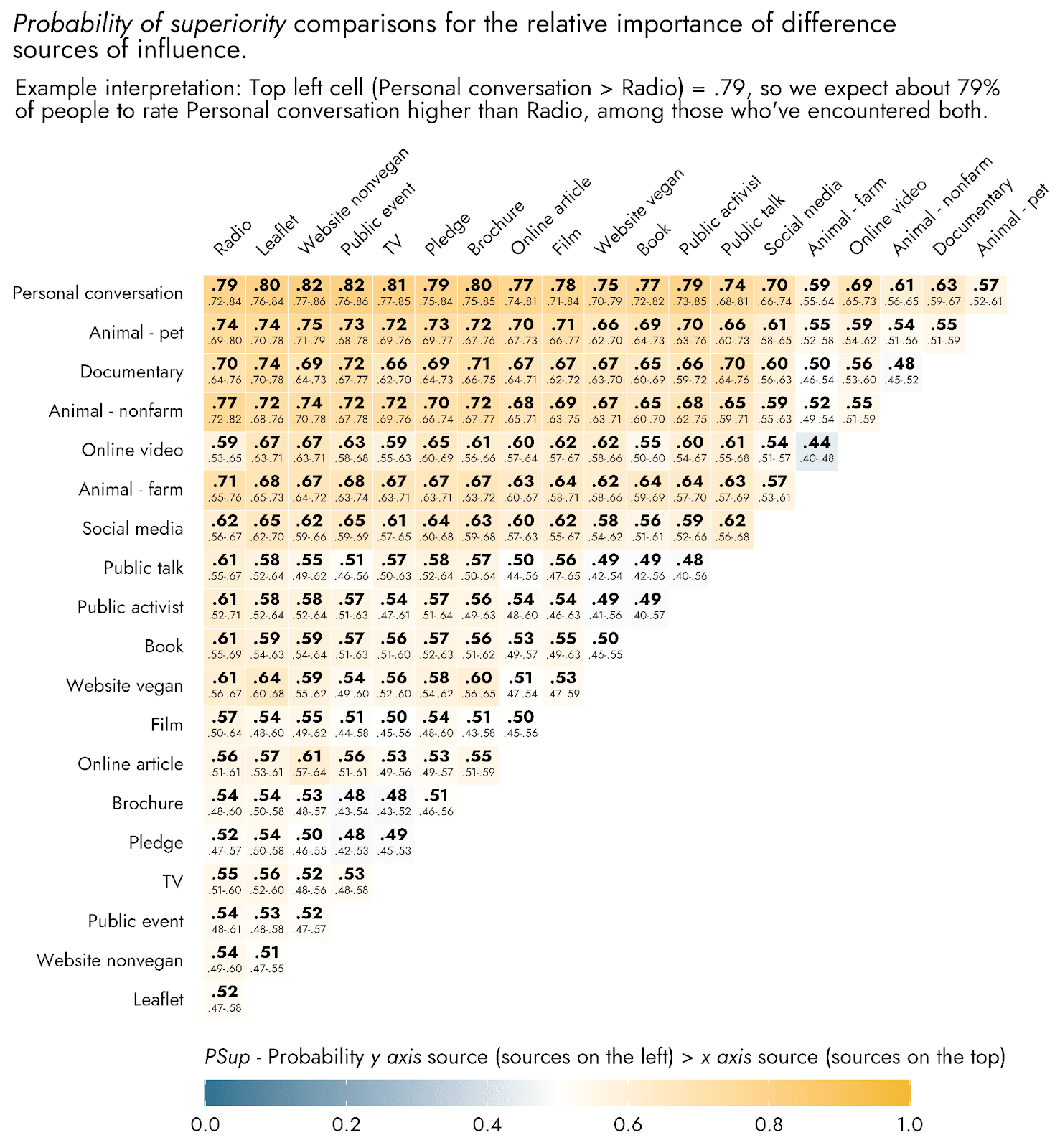
Acknowledgements

This post is a project of Rethink Priorities–a think tank dedicated to informing decisions made by high-impact organizations and funders across various cause areas.
Jamie Elsey conducted analyses and visualized the results, and Jamie Elsey and David Moss wrote the report. We would also like to thank Emily Grundy, who reviewed literature and began preparing this report as a summer research fellow at Rethink Priorities in 2021.
- ^
Some presentations of raw data did not differentiate responses by gender, but we retained the same overarching sample for consistency
- ^
The term 'veg_n' is used to refer to vegan/vegetarian diets, saving space in the graphs
Matt_Sharp @ 2023-08-24T20:55 (+11)
Nice study, thanks for sharing!
Environmental and health concerns were found to be of increasing importance among those adopting their diet more recently, which may reflect increasing awareness of and advocacy regarding possible health benefits of plant-based diets, as well as increasing concerns over anthropogenic climate change
Could this also be due to survivorship bias? If environmental/health motivations are associated with giving up being veg*n sooner than animal welfare motivations, then in cohorts that adopted their diet longer ago, relatively more of the environmental/health motivated people would have dropped out compared to more recent cohorts.
Jamie Elsey @ 2023-08-25T10:33 (+4)
Hi Matt, yes indeed it could also be due to survivorship bias, or a combination of survivorship and the suggestions I made.
Not based on anything empirical but I imagine that health related reasons are probably especially vulnerable to drop out because potentially all it takes is finding some other diet that promises health benefits and the person might make a switch.
InquilineKea @ 2023-09-10T03:25 (+4)
As N=1, I became vegetarian in 7th grade. Extreme levels of disgust-sensitivity [PETA is good at this] fueled this decision and I feel like I want to puke if I taste meat (I suspect disgust-sensitivity isn't as big of a factor in utilitarian EAs who go veg*)...
The factors were:
- personal interactions with chickens I had when staying over at a Woodinville farm (and then personal interactions with a Bellevue Chinese restaurant where I felt angered at how insensitive people were killing the aquarium fish right on site just for dishes (I was seeing murder at site). I stopped eating fish/chicken first, before I stopped eating all the other meats.
- PETA [and other veg*n advocacy sites] successfully grossing me out (eg "poop-contaminated meat") to the extent that I could not stand the taste of meat anymore. I did try fish once for the hell of it last year (when food was low) and still disliked the taste
- I was kind of obsessed with animals (Wildlife Factfile, Grolier, watching Wild Discovery, a book on fish my mom once checked out of the Redmond library which gave me intense appreciation of all the different species of fish [1]) and environmental protection even in my very early years [eg I was a super-notorious environmentalist in 2nd grade, and started freaking out about climate change in 5th grade due to an unusually hot summer in Denver]. This is partly because of the green (or at least pro-animals) messages that are sent in a lot of children's reading material
- Intense rage/hypocrisy at how humans were treating animals in general. Also me being mad at my parents for how little they cared [even though I didn't mind it as much in friends if they didn't go veg]... (contrarianism against parents...)
- a Seattle Times article about calorie restriction (and vegetarian diets are very obviously lower in calories). Along with all the health reasons (eg no saturated fat). Health factors were not the primary factors back then, but I would say that they are overwhelmingly the reason I now stay vegetarian (ofc to me there are still a million arguments for and almost none against, so it doesn't make sense for me not to be veg*).
During 7th grade, I remember all the vicious vegetarianism debates on Age of Kings Heaven/HeavenGames [lol @ f18fett's weird arguments against vegetarianism, as well as all the right-wingers who were against it], especially when I joined in with the other compassionate/left-wing forumers on those massive debate threads.
Going vegetarian + going to college early were the two kinds of contrarianism that I took that I am proudest of.
[1] Never realizing that it would cause intense amounts of family fighting when I finally took the plunge and became vegetarian. Ofc, this was not the end of family fighting over food (when I later also decided to turn against rice)
Jamie Elsey @ 2023-09-11T15:16 (+3)
Thanks for sharing your experience on becoming vegetarian! There were also several people in the survey who said things such as just finding it disgusting.
oivavoi @ 2023-08-27T07:40 (+4)
Thanks a lot, this was very useful to me!
The main limitation here, I think, is that "personal conversation" remains a black box. What kind of arguments were put forward in these conversations? Or, was it arguments at all, or rather seeing the behavioral example of others?
But there exists research on this which is illuminating and can shed light on these questions. Robert Frank's "Under the influence" is a very good primer on these mechanisms, I think. Good podcast/intro here: Peer pressure and social change - WHYY
Jamie Elsey @ 2023-08-29T09:35 (+3)
Glad you've found it useful!
Indeed, the personal conversation is a bit of a black box and in open responses people gave to provide more information, most did not note specific content or arguments but rather just the type of person it was - often family members, partners, and close friends. It doesn't necessarily seem like the conversations were in the form of people trying to 'convince' them or argue with them about becoming vegetarian
oivavoi @ 2023-08-29T19:31 (+1)
Thanks, very interesting!
mcint @ 2023-09-03T01:42 (+1)
You should ask people themselves what reasons would convince them.
mcint @ 2023-09-03T01:08 (+1)
Thank you for sharing a(n extensive) quick analysis!
Nit about color schemes, please use darker colors to convey more important data, in this case, it seems that emphasizing the fraction of survey respondents reporting a reason as "Extremely influential" (rating 5) serves the purpose of your analysis better than fraction reporting a reason was "Not an influence at all" (rating 1).
To be clear, the fact of high reported importance from respondents might not always have highest relevance for readers, but high reported importance does seem your greatest interest here.
I misread (and conveyed to others) an exactly backwards interpretation of the cumulative percentage rating diagrams, due to the color scheme, and the legends split across the top and bottom of the visualizations.
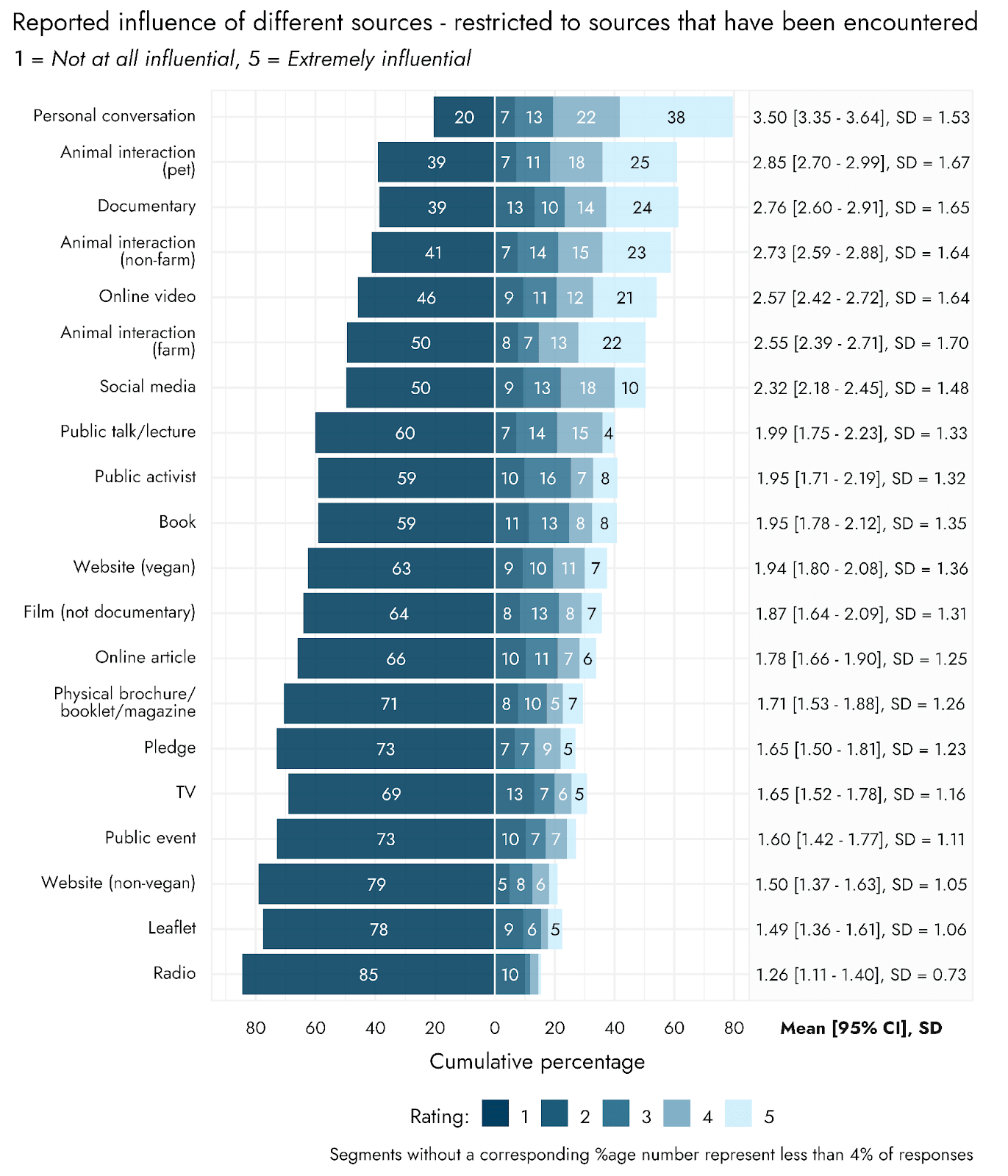
I did find the consistent left-greater orientation helpful.
mcint @ 2023-09-03T01:20 (+1)
On seeing this tweeted, and noticing the alignment of "rating 1" percentages, I think I should more correctly understand your emphasis as: ranking of factors to minimize the fraction of people reporting "no influence" for the factor.
Jamie Elsey @ 2023-09-04T09:33 (+4)
Hi mcint, I've made some changes to the plots such that the colors are now darker for higher ratings, and the rating numbers and meaning are all positioned at the top, so it should be less open to misinterpreting what information is presented.
The ordering of the items is just in ordering of descending mean ratings.
mcint @ 2023-09-13T22:43 (+1)
That makes sense. Thank you for your responsiveness!! And for making updates, though I'm not my advice should be followed nor that all of my suggestions improve fitness-for-purpose, as I'm unsure that I understood the goals of this post and strategy well enough. My suggestions came from what I now regard as hopeful misinterpretation on my part.
I do think dark colors should be used to focus emphasis on what your analysis aims to show, or else use a background box to highlight the sub-portion of a chart that you're emphasizing.
I agree with concerned raised in the Discussion and Limitations section, and admit I skimmed these too lightly earlier. However, I think I'm expanding on them.
I mainly have doubt around--and trouble actionably interpreting--statements (or hypotheses, or survey questions) that "X [method] has low likelihood [of changing a belief]" [by itself]--to make explicit what I think is a hidden premise, or of "making a difference", where the first difference is "noticing".
(Source)
I worry that the data collected (about influence methods) just recapitulates a public-to-private gradient, which itself could predict the low-to-high relevance and affiliation survey results, while the paper does not account for this expectation. That is: we already know people don't like radio ads and do like having conversations with their friends. In a survey, I would expect that people think radio is not relevant to their thinking. However, broadcasting vegan-promoting ads will cause more conversations, encourage a little more research, and normalize the choice. The post acknowledges similar considerations, but I want to encourage these considerations to have more effect on the analysis chosen.
EA vegans & animal welfare promoters are already in self-assorted groups, and friends with many who could-be-convinced, and unconnected to many people who object. I would be curious to see EA cause conversion funnels: estimated sizes of populations at each level, what conversions and methods for each (conversion-stage, reason) for inviting people further along progressions.
Could the existing collected data be used to analyze the most convincing influence methods grouped by the individual's reason for making diet choices? Answering approximately: "Retrospectively, what influence made the final difference in you arriving at your current chosen diet?"--before making a model.
(Columbia & Stanford business schools paper on alumni donor modelling)
Broad-base advertising aims to achieve a different purpose than one-on-one conversations, and awareness raising in broadcast media can make those one-on-one conversations more possible, more common, and more effective. I worry the data and analysis published here discourage spending at the top of the funnel, by accounting for something like "strength of belief" and resultant action, without multiplying that by "size of population reached".
It's much easier to argue X works than X does not work. I think we should look for things that work, and apply a portfolio approach. I think it's really hard to effectively argue
I think I naively model these I know I would love to hear EA ads on the radio or billboard, or places that create common knowledge of exposure, because I could bring it up with friends.
